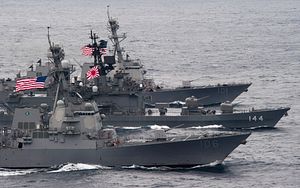Japanese and Chinese officials are holding informal talks in Beijing this week, in an attempt to forge a framework for managing territorial disputes at sea, particularly around the Senkaku/Daioyu Islands. The meeting is timely, as Japan has sought better overall relations with China in the last few months and the two circle around the topic of whether their two leaders will meet on the sidelines of next month’s APEC summit, also in Beijing. These talks also occur as tensions between the two countries, which had heightened with frequent naval confrontations around the disputed islands, have now eased noticeably.
A Japanese delegation of the Sasakawa Peace Foundation, led by former officers of the Air and Marine Self-Defense Forces, are meeting with several Chinese defense specialists on Wednesday and Thursday, “to promote private-sector dialogue aimed at averting accidental armed conflicts,” according to sources who spoke with the Yomiuri Shimbun. While current and former defense officials on both sides will be meeting, the talks are deemed a “private-sector effort,” in an attempt to facilitate the creation of a hotline between official defense authorities. The idea of a hotline, which was resurrected in September, would provide a direct link between Japanese and Chinese military officials in order to clear confusion and facilitate dialogue to contain the kinds of incidents that have occurred around the disputed islands for more than two years now.
A Japanese defense ministry official that spoke with the Yomiuri said that both governments hope to resume talks over the hotline by year’s end, while foundation officials have said “There will be two days of talks in the Chinese capital followed by two more meetings that will be held in Japan or China in the coming months, with a report expected early next year.”
These talks between defense officials are likely to be much more fruitful in terms of improving the tense maritime situation in the East China Sea than any quick meeting between Prime Minister Shinzo Abe and President Xi Jinping at the APEC Summit. The envisioned hotline might also help to prevent further near mid-air collisions between surveillance and fighter aircraft. The two countries’ overlapping Air Defense Identification Zones (ADIZ) have led to several close calls.
The stated timeline for the hotline will also likely occur roughly alongside the expected update to the Japan-U.S. defense cooperation guidelines, which according to unofficial statements from both sides could now happen as late as next April. If so, then the hotline could prove to be increasingly useful, as Japan is seeking to enhance cooperation, particularly in relation to China’s growing military presence in the East China Sea. If Japan and the U.S. are set to better define and even increase Tokyo’s role in regional defense, then the ability to reach out to China and quickly deescalate unintentional conflict will become paramount.

































